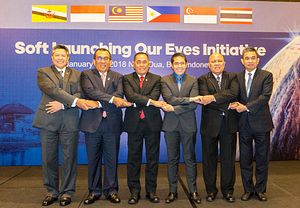Late last month, Southeast Asian states held a working group meeting to discuss the status of a new intelligence-sharing initiative to help them respond more quickly and effectively to transnational security threats. The meeting spotlighted the effort amid the broader context of regional responses to terrorism and radicalism in Southeast Asia and the Asia-Pacific more generally.
As I have noted before in these pages, Southeast Asian states have taken a series of steps to address terrorism, one of which is what has come to be known as the ASEAN Our Eyes Initiative (AOEI). The AOEI, which derives its name from the “Five Eyes” intelligence network that the United States has with its four Anglophone allies, was initially officially proposed by Indonesia as a information-sharing platform for member countries designed to facilitate the exchange of intelligence on terrorism, radicalism, and violent extremism.
Over time, the AOEI, which began initially between Indonesia, Malaysia, and the Philippines, has been discussed in terms of broader multilateral fora, including through a series of working group meetings. The first meeting was held in Jakarta in 2018, while the second meeting was held in Semarang in 2019.
Last week, Indonesia hosted the third AOEI meeting, consistent with the annual holding of the meetings we have seen to date. The third meeting kicked off as scheduled on March 3 in Palembang, Indonesia at the Hall Novotel Palembang Hotel.
Per Indonesia’s defense ministry (KEMHAN), the third AOEI meeting was attended by representatives from defense ministries from each of the Southeast Asian countries, an illustration of the gradual broadening of the initiative’s focus. The meeting was centered around a series of themes, including the impact of the decline of the Islamic State in the Middle East as well as new partnerships by Southeast Asian states to combat terrorism and radicalism in the region.
According to KEMHAN, the meeting saw the discussion of several topics, including mechanisms of cooperation for the exchange of strategic information. Remarks by the director of international cooperation at Indonesia’s defense ministry reinforced the urgency of coming up with means of collaboration given the broad nature of the terrorism challenge and previous incidents in the region including the Marawi crisis, as well as the importance of coordination and integration in efforts being undertaken.
Unsurprisingly, not much in the way of specifics was publicly disclosed about the private deliberations between the Southeast Asian states. Nonetheless, given the significance of the AOEI, its evolution and manifestations will continue to be important to watch among wider developments in the regional security landscape.

































